Kenneth Atchity's Blog, page 88
November 8, 2019
Ken Atchity Quote...
“Write to make a difference. Write because you have something to say to us all. In dramatic writing, fiction, and nonfiction, this means knowing exactly what your work is about and being able to tell the publisher in ten words or less..."
― Kenneth Atchity, Write Time: Guide to the Creative Process, from Vision through Revision-and Beyond
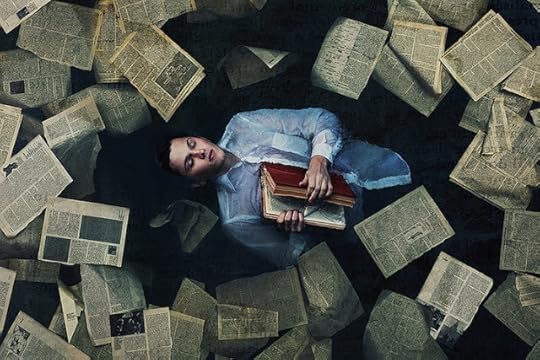
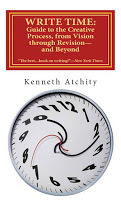
Available on Amazon
― Kenneth Atchity, Write Time: Guide to the Creative Process, from Vision through Revision-and Beyond


Available on Amazon

Published on November 08, 2019 00:00
November 6, 2019
Martin Scorsese: Marvel Movies Aren’t Cinema.
Martin Scorsese: I Said Marvel Movies Aren’t Cinema. Let Me Explain.
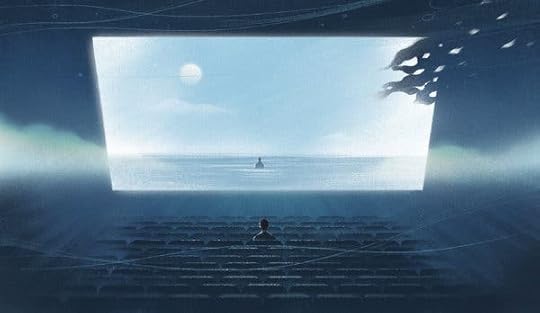
Cinema is an art form that brings you the unexpected. In superhero movies, nothing is at risk, a director says.
“It’s a perilous time in film exhibition, and there are fewer independent theaters than ever,” says Martin Scorsese.
“It’s a perilous time in film exhibition, and there are fewer independent theaters than ever,” says Martin Scorsese.
When I was in England in early October, I gave an interview to Empire magazine. I was asked a question about Marvel movies. I answered it. I said that I’ve tried to watch a few of them and that they’re not for me, that they seem to me to be closer to theme parks than they are to movies as I’ve known and loved them throughout my life, and that in the end, I don’t think they’re cinema.
Some people seem to have seized on the last part of my answer as insulting, or as evidence of hatred for Marvel on my part. If anyone is intent on characterizing my words in that light, there’s nothing I can do to stand in the way.
Many franchise films are made by people of considerable talent and artistry. You can see it on the screen. The fact that the films themselves don’t interest me is a matter of personal taste and temperament. I know that if I were younger, if I’d come of age at a later time, I might have been excited by these pictures and maybe even wanted to make one myself. But I grew up when I did and I developed a sense of movies — of what they were and what they could be — that was as far from the Marvel universe as we on Earth are from Alpha Centauri.
For me, for the filmmakers I came to love and respect, for my friends who started making movies around the same time that I did, cinema was about revelation — aesthetic, emotional and spiritual revelation. It was about characters — the complexity of people and their contradictory and sometimes paradoxical natures, the way they can hurt one another and love one another and suddenly come face to face with themselves.
It was about confronting the unexpected on the screen and in the life it dramatized and interpreted, and enlarging the sense of what was possible in the art form.
And that was the key for us: it was an art form. There was some debate about that at the time, so we stood up for cinema as an equal to literature or music or dance. And we came to understand that the art could be found in many different places and in just as many forms — in “The Steel Helmet” by Sam Fuller and “Persona” by Ingmar Bergman, in “It’s Always Fair Weather” by Gene Kelly and Stanley Donen and “Scorpio Rising” by Kenneth Anger, in “Vivre Sa Vie” by Jean-Luc Godard and “The Killers” by Don Siegel.
Or in the films of Alfred Hitchcock — I suppose you could say that Hitchcock was his own franchise. Or that he was our franchise. Every new Hitchcock picture was an event. To be in a packed house in one of the old theaters watching “Rear Window” was an extraordinary experience: It was an event created by the chemistry between the audience and the picture itself, and it was electrifying.
And in a way, certain Hitchcock films were also like theme parks. I’m thinking of “Strangers on a Train,” in which the climax takes place on a merry-go-round at a real amusement park, and “Psycho,” which I saw at a midnight show on its opening day, an experience I will never forget. People went to be surprised and thrilled, and they weren’t disappointed.
Sixty or 70 years later, we’re still watching those pictures and marveling at them. But is it the thrills and the shocks that we keep going back to? I don’t think so. The set pieces in “North by Northwest” are stunning, but they would be nothing more than a succession of dynamic and elegant compositions and cuts without the painful emotions at the center of the story or the absolute lostness of Cary Grant’s character.
The climax of “Strangers on a Train” is a feat, but it’s the interplay between the two principal characters and Robert Walker’s profoundly unsettling performance that resonate now.
Some say that Hitchcock’s pictures had a sameness to them, and perhaps that’s true — Hitchcock himself wondered about it. But the sameness of today’s franchise pictures is something else again. Many of the elements that define cinema as I know it are there in Marvel pictures. What’s not there is revelation, mystery or genuine emotional danger. Nothing is at risk. The pictures are made to satisfy a specific set of demands, and they are designed as variations on a finite number of themes.
They are sequels in name but they are remakes in spirit, and everything in them is officially sanctioned because it can’t really be any other way. That’s the nature of modern film franchises: market-researched, audience-tested, vetted, modified, revetted and remodified until they’re ready for consumption.
Another way of putting it would be that they are everything that the films of Paul Thomas Anderson or Claire Denis or Spike Lee or Ari Aster or Kathryn Bigelow or Wes Anderson are not. When I watch a movie by any of those filmmakers, I know I’m going to see something absolutely new and be taken to unexpected and maybe even unnameable areas of experience. My sense of what is possible in telling stories with moving images and sounds is going to be expanded.
So, you might ask, what’s my problem? Why not just let superhero films and other franchise films be? The reason is simple. In many places around this country and around the world, franchise films are now your primary choice if you want to see something on the big screen. It’s a perilous time in film exhibition, and there are fewer independent theaters than ever. The equation has flipped and streaming has become the primary delivery system. Still, I don’t know a single filmmaker who doesn’t want to design films for the big screen, to be projected before audiences in theaters.
That includes me, and I’m speaking as someone who just completed a picture for Netflix. It, and it alone, allowed us to make “The Irishman” the way we needed to, and for that I’ll always be thankful. We have a theatrical window, which is great. Would I like the picture to play on more big screens for longer periods of time? Of course I would. But no matter whom you make your movie with, the fact is that the screens in most multiplexes are crowded with franchise pictures.
And if you’re going to tell me that it’s simply a matter of supply and demand and giving the people what they want, I’m going to disagree. It’s a chicken-and-egg issue. If people are given only one kind of thing and endlessly sold only one kind of thing, of course they’re going to want more of that one kind of thing.
But, you might argue, can’t they just go home and watch anything else they want on Netflix or iTunes or Hulu? Sure — anywhere but on the big screen, where the filmmaker intended her or his picture to be seen.
In the past 20 years, as we all know, the movie business has changed on all fronts. But the most ominous change has happened stealthily and under cover of night: the gradual but steady elimination of risk. Many films today are perfect products manufactured for immediate consumption. Many of them are well made by teams of talented individuals. All the same, they lack something essential to cinema: the unifying vision of an individual artist. Because, of course, the individual artist is the riskiest factor of all.
I’m certainly not implying that movies should be a subsidized art form, or that they ever were. When the Hollywood studio system was still alive and well, the tension between the artists and the people who ran the business was constant and intense, but it was a productive tension that gave us some of the greatest films ever made — in the words of Bob Dylan, the best of them were “heroic and visionary.”
Today, that tension is gone, and there are some in the business with absolute indifference to the very question of art and an attitude toward the history of cinema that is both dismissive and proprietary — a lethal combination. The situation, sadly, is that we now have two separate fields: There’s worldwide audiovisual entertainment, and there’s cinema. They still overlap from time to time, but that’s becoming increasingly rare. And I fear that the financial dominance of one is being used to marginalize and even belittle the existence of the other.
For anyone who dreams of making movies or who is just starting out, the situation at this moment is brutal and inhospitable to art. And the act of simply writing those words fills me with terrible sadness.
Read more


Cinema is an art form that brings you the unexpected. In superhero movies, nothing is at risk, a director says.
“It’s a perilous time in film exhibition, and there are fewer independent theaters than ever,” says Martin Scorsese.
“It’s a perilous time in film exhibition, and there are fewer independent theaters than ever,” says Martin Scorsese.
When I was in England in early October, I gave an interview to Empire magazine. I was asked a question about Marvel movies. I answered it. I said that I’ve tried to watch a few of them and that they’re not for me, that they seem to me to be closer to theme parks than they are to movies as I’ve known and loved them throughout my life, and that in the end, I don’t think they’re cinema.
Some people seem to have seized on the last part of my answer as insulting, or as evidence of hatred for Marvel on my part. If anyone is intent on characterizing my words in that light, there’s nothing I can do to stand in the way.
Many franchise films are made by people of considerable talent and artistry. You can see it on the screen. The fact that the films themselves don’t interest me is a matter of personal taste and temperament. I know that if I were younger, if I’d come of age at a later time, I might have been excited by these pictures and maybe even wanted to make one myself. But I grew up when I did and I developed a sense of movies — of what they were and what they could be — that was as far from the Marvel universe as we on Earth are from Alpha Centauri.
For me, for the filmmakers I came to love and respect, for my friends who started making movies around the same time that I did, cinema was about revelation — aesthetic, emotional and spiritual revelation. It was about characters — the complexity of people and their contradictory and sometimes paradoxical natures, the way they can hurt one another and love one another and suddenly come face to face with themselves.
It was about confronting the unexpected on the screen and in the life it dramatized and interpreted, and enlarging the sense of what was possible in the art form.
And that was the key for us: it was an art form. There was some debate about that at the time, so we stood up for cinema as an equal to literature or music or dance. And we came to understand that the art could be found in many different places and in just as many forms — in “The Steel Helmet” by Sam Fuller and “Persona” by Ingmar Bergman, in “It’s Always Fair Weather” by Gene Kelly and Stanley Donen and “Scorpio Rising” by Kenneth Anger, in “Vivre Sa Vie” by Jean-Luc Godard and “The Killers” by Don Siegel.
Or in the films of Alfred Hitchcock — I suppose you could say that Hitchcock was his own franchise. Or that he was our franchise. Every new Hitchcock picture was an event. To be in a packed house in one of the old theaters watching “Rear Window” was an extraordinary experience: It was an event created by the chemistry between the audience and the picture itself, and it was electrifying.
And in a way, certain Hitchcock films were also like theme parks. I’m thinking of “Strangers on a Train,” in which the climax takes place on a merry-go-round at a real amusement park, and “Psycho,” which I saw at a midnight show on its opening day, an experience I will never forget. People went to be surprised and thrilled, and they weren’t disappointed.
Sixty or 70 years later, we’re still watching those pictures and marveling at them. But is it the thrills and the shocks that we keep going back to? I don’t think so. The set pieces in “North by Northwest” are stunning, but they would be nothing more than a succession of dynamic and elegant compositions and cuts without the painful emotions at the center of the story or the absolute lostness of Cary Grant’s character.
The climax of “Strangers on a Train” is a feat, but it’s the interplay between the two principal characters and Robert Walker’s profoundly unsettling performance that resonate now.
Some say that Hitchcock’s pictures had a sameness to them, and perhaps that’s true — Hitchcock himself wondered about it. But the sameness of today’s franchise pictures is something else again. Many of the elements that define cinema as I know it are there in Marvel pictures. What’s not there is revelation, mystery or genuine emotional danger. Nothing is at risk. The pictures are made to satisfy a specific set of demands, and they are designed as variations on a finite number of themes.
They are sequels in name but they are remakes in spirit, and everything in them is officially sanctioned because it can’t really be any other way. That’s the nature of modern film franchises: market-researched, audience-tested, vetted, modified, revetted and remodified until they’re ready for consumption.
Another way of putting it would be that they are everything that the films of Paul Thomas Anderson or Claire Denis or Spike Lee or Ari Aster or Kathryn Bigelow or Wes Anderson are not. When I watch a movie by any of those filmmakers, I know I’m going to see something absolutely new and be taken to unexpected and maybe even unnameable areas of experience. My sense of what is possible in telling stories with moving images and sounds is going to be expanded.
So, you might ask, what’s my problem? Why not just let superhero films and other franchise films be? The reason is simple. In many places around this country and around the world, franchise films are now your primary choice if you want to see something on the big screen. It’s a perilous time in film exhibition, and there are fewer independent theaters than ever. The equation has flipped and streaming has become the primary delivery system. Still, I don’t know a single filmmaker who doesn’t want to design films for the big screen, to be projected before audiences in theaters.
That includes me, and I’m speaking as someone who just completed a picture for Netflix. It, and it alone, allowed us to make “The Irishman” the way we needed to, and for that I’ll always be thankful. We have a theatrical window, which is great. Would I like the picture to play on more big screens for longer periods of time? Of course I would. But no matter whom you make your movie with, the fact is that the screens in most multiplexes are crowded with franchise pictures.
And if you’re going to tell me that it’s simply a matter of supply and demand and giving the people what they want, I’m going to disagree. It’s a chicken-and-egg issue. If people are given only one kind of thing and endlessly sold only one kind of thing, of course they’re going to want more of that one kind of thing.
But, you might argue, can’t they just go home and watch anything else they want on Netflix or iTunes or Hulu? Sure — anywhere but on the big screen, where the filmmaker intended her or his picture to be seen.
In the past 20 years, as we all know, the movie business has changed on all fronts. But the most ominous change has happened stealthily and under cover of night: the gradual but steady elimination of risk. Many films today are perfect products manufactured for immediate consumption. Many of them are well made by teams of talented individuals. All the same, they lack something essential to cinema: the unifying vision of an individual artist. Because, of course, the individual artist is the riskiest factor of all.
I’m certainly not implying that movies should be a subsidized art form, or that they ever were. When the Hollywood studio system was still alive and well, the tension between the artists and the people who ran the business was constant and intense, but it was a productive tension that gave us some of the greatest films ever made — in the words of Bob Dylan, the best of them were “heroic and visionary.”
Today, that tension is gone, and there are some in the business with absolute indifference to the very question of art and an attitude toward the history of cinema that is both dismissive and proprietary — a lethal combination. The situation, sadly, is that we now have two separate fields: There’s worldwide audiovisual entertainment, and there’s cinema. They still overlap from time to time, but that’s becoming increasingly rare. And I fear that the financial dominance of one is being used to marginalize and even belittle the existence of the other.
For anyone who dreams of making movies or who is just starting out, the situation at this moment is brutal and inhospitable to art. And the act of simply writing those words fills me with terrible sadness.
Read more

Published on November 06, 2019 00:00
November 4, 2019
My personal, tiny, attempts at helping our poor planet by Dave Davis
There are little things that we can do, not drifting helplessly in a sea of worry

Cows are not great for the environment, writes Dave Davis, but they are deserving of a dignified life regardless. - Rich Pedroncelli , The Associated Press
It was Lent or something close to it, and we were visiting our good friends-friends for life in Virginia for a few days. Wonderful couple, two fine sons, grandkids, the most hospitable people on the planet, with one slight difference from most of our friends: they were and are strict vegans. Soy milk, grains, veggies and fruit vegans. With good cause too, they said.
They had both read (digested you might say) the book, The China Study: The Most Comprehensive Study of Nutrition Ever Conducted and the Startling Implications for Diet, Weight Loss and Long-Term Health by Thomas M. Campbell. They were firm believers in its conclusions, namely that our current eating habits were a major cause of cancer and other health problems.
Plus, it wasn't good for the planet.
I read it too. My wife and I decided we'd give up our regular diet (it was Lent after all) and, for 48 hours for her, longer for me, we did. Soya milk, faux-cheese, plant-based foods. Finding out where the vegan food shelf was in the local grocery store (there are actually several shelves now). I lasted maybe two weeks as a vegan, disturbed by dreams about chicken legs and cheeseburgers; I've slowly added back things like fish and chicken. A lot of chicken, I must say: my wife thinks I'll grow feathers one day.
Fast forward 10 years. The diet has slowly morphed. I'm certainly no vegan — more like a vegetarian who eats fish and chicken — but I've never returned fully to a regular North American diet. For the most part, I avoid red meat, thinking a couple things. One: most, though not all authorities, say that too much red meat isn't good for your body (there's evidence about heart disease, cancer and gout. Check out what the World Health Organization has to say.) Two: mostly now, I have to say, if a little sheepishly, it's my bit for the planet. Take cows for example: the amount of grain it takes to feed them, and the amount of gas they expel make them contributors to the greenhouse effect. And then there's this: I like to think they're sentient, deserving of life as much as we are.
Recently I read something in The New Yorker, a brilliantly crafted piece by Jonathan Franzen, an awesome writer. "What if we stop pretending?" he asks. Pretending what? Pretending that a global apocalypse of climate change will not engulf us all, and if not us, then our kids or grandkids.
Words are powerful tools. He makes a convincing case about climate change and our hurtling headlong into planetary disaster, as though that were a certainty. There are other opinions of course: my daughter, for example, thinks the planet will survive, thank you very much. I agree with her; it's us that I worry about. Franzen makes one very good point: faced with annihilation (in fact, faced with anything out of our control), we do two things. First, we deny the fact, since there's so little we can do; take our death for example. We only think about it episodically, not focusing on it. Breakfast though, Franzen says, breakfast he can focus on. I can relate to that (no bacon, though).
Or we do little things — not only in the planet-preserving, recycling, plastic-sparing mode, but also in little things that build friendships, equity and social justice. Regardless of the details, his piece is provocative, worth a read, and debate. And I agree with him about little things that we can do, not drifting helplessly in a sea of worry or self-pity (or worse, he says, denial).
That got me thinking about my dad. He was another Dave Davis (there are actually a lot of us out there) but to his many friends and even us he was "D.O.," a unique guy. In the 60s, faced with retirement from Dofasco, he started something called Third Sector, geared to recycling newspaper, kick-starting the blue box phenomenon locally, taking men off welfare rolls and giving them employment. The third way, he called it, involving the public sector and the private, a kind of collaboration. Ahead of his time, that D.O., even ahead of global warming.
Maybe that's what the not-really-vegan diet is: a kind of personal if tiny attempt to help the planet, by helping myself. It's not really very much but it's something we can do, like washing out the plastic to recycle it. Like turning lights off when we're not in the room. Like walking wherever we can, avoiding the oversized, cumbersome, gas-guzzling things that clog our roads.
And like us, even if we don't join them, we can admire our vegan friends (who continue to be amazingly hale and hearty, thanks for asking). Oh, and one more thing: maybe growing feathers, or gills — gills might be good for the high-water, flooding apocalypse thing.
Dave Davis, MD, is a husband, father and grandfather, a retired family doc and medical educator. His first novel, "A Potter's Tale," published by Story Merchant Books, Los Angeles, is available on Amazon in Canada, CA, the US and the UK. You can visit him at www.drdavedavis.com, follow him @drauthor24, or write him at drdavedavis.com.
Dave Davis, MD, is a husband, father and grandfather, a retired family doc and medical educator. His first novel, “A Potter’s Tale,” published by Story Merchant Books, Los Angeles, is available on Amazon in Canada, CA, the US and the UK. You can visit him at www.drdavedavis.com, follow him @drauthor24, or write him at drdavedavis.com.


Cows are not great for the environment, writes Dave Davis, but they are deserving of a dignified life regardless. - Rich Pedroncelli , The Associated Press
It was Lent or something close to it, and we were visiting our good friends-friends for life in Virginia for a few days. Wonderful couple, two fine sons, grandkids, the most hospitable people on the planet, with one slight difference from most of our friends: they were and are strict vegans. Soy milk, grains, veggies and fruit vegans. With good cause too, they said.
They had both read (digested you might say) the book, The China Study: The Most Comprehensive Study of Nutrition Ever Conducted and the Startling Implications for Diet, Weight Loss and Long-Term Health by Thomas M. Campbell. They were firm believers in its conclusions, namely that our current eating habits were a major cause of cancer and other health problems.
Plus, it wasn't good for the planet.
I read it too. My wife and I decided we'd give up our regular diet (it was Lent after all) and, for 48 hours for her, longer for me, we did. Soya milk, faux-cheese, plant-based foods. Finding out where the vegan food shelf was in the local grocery store (there are actually several shelves now). I lasted maybe two weeks as a vegan, disturbed by dreams about chicken legs and cheeseburgers; I've slowly added back things like fish and chicken. A lot of chicken, I must say: my wife thinks I'll grow feathers one day.
Fast forward 10 years. The diet has slowly morphed. I'm certainly no vegan — more like a vegetarian who eats fish and chicken — but I've never returned fully to a regular North American diet. For the most part, I avoid red meat, thinking a couple things. One: most, though not all authorities, say that too much red meat isn't good for your body (there's evidence about heart disease, cancer and gout. Check out what the World Health Organization has to say.) Two: mostly now, I have to say, if a little sheepishly, it's my bit for the planet. Take cows for example: the amount of grain it takes to feed them, and the amount of gas they expel make them contributors to the greenhouse effect. And then there's this: I like to think they're sentient, deserving of life as much as we are.
Recently I read something in The New Yorker, a brilliantly crafted piece by Jonathan Franzen, an awesome writer. "What if we stop pretending?" he asks. Pretending what? Pretending that a global apocalypse of climate change will not engulf us all, and if not us, then our kids or grandkids.
Words are powerful tools. He makes a convincing case about climate change and our hurtling headlong into planetary disaster, as though that were a certainty. There are other opinions of course: my daughter, for example, thinks the planet will survive, thank you very much. I agree with her; it's us that I worry about. Franzen makes one very good point: faced with annihilation (in fact, faced with anything out of our control), we do two things. First, we deny the fact, since there's so little we can do; take our death for example. We only think about it episodically, not focusing on it. Breakfast though, Franzen says, breakfast he can focus on. I can relate to that (no bacon, though).
Or we do little things — not only in the planet-preserving, recycling, plastic-sparing mode, but also in little things that build friendships, equity and social justice. Regardless of the details, his piece is provocative, worth a read, and debate. And I agree with him about little things that we can do, not drifting helplessly in a sea of worry or self-pity (or worse, he says, denial).
That got me thinking about my dad. He was another Dave Davis (there are actually a lot of us out there) but to his many friends and even us he was "D.O.," a unique guy. In the 60s, faced with retirement from Dofasco, he started something called Third Sector, geared to recycling newspaper, kick-starting the blue box phenomenon locally, taking men off welfare rolls and giving them employment. The third way, he called it, involving the public sector and the private, a kind of collaboration. Ahead of his time, that D.O., even ahead of global warming.
Maybe that's what the not-really-vegan diet is: a kind of personal if tiny attempt to help the planet, by helping myself. It's not really very much but it's something we can do, like washing out the plastic to recycle it. Like turning lights off when we're not in the room. Like walking wherever we can, avoiding the oversized, cumbersome, gas-guzzling things that clog our roads.
And like us, even if we don't join them, we can admire our vegan friends (who continue to be amazingly hale and hearty, thanks for asking). Oh, and one more thing: maybe growing feathers, or gills — gills might be good for the high-water, flooding apocalypse thing.
Dave Davis, MD, is a husband, father and grandfather, a retired family doc and medical educator. His first novel, "A Potter's Tale," published by Story Merchant Books, Los Angeles, is available on Amazon in Canada, CA, the US and the UK. You can visit him at www.drdavedavis.com, follow him @drauthor24, or write him at drdavedavis.com.
Dave Davis, MD, is a husband, father and grandfather, a retired family doc and medical educator. His first novel, “A Potter’s Tale,” published by Story Merchant Books, Los Angeles, is available on Amazon in Canada, CA, the US and the UK. You can visit him at www.drdavedavis.com, follow him @drauthor24, or write him at drdavedavis.com.

Published on November 04, 2019 00:00
November 1, 2019
New From Story Merchant Books Stressed in the U.S. by Dr. Meg Van Deusen
It seems like the American public is more “stressed out” than at any time in recent memory. But why? Is this seemingly sudden increase in stress due to current events in our world? Is technology to blame? Perhaps financial strain or increased pressures at work? Or is it all simply a coincidence?
Host David B. Feldman interviews Dr. Meg Van Deusen, psychologist and author of Stressed in the U.S.: Twelve Tools to Tackle Anxiety, Loneliness, Tech-Addiction, and More, due out December 1st, 2019.


Host David B. Feldman interviews Dr. Meg Van Deusen, psychologist and author of Stressed in the U.S.: Twelve Tools to Tackle Anxiety, Loneliness, Tech-Addiction, and More, due out December 1st, 2019.


Published on November 01, 2019 00:00
October 30, 2019
Ken Atchity Quotes ...
“Discipline, not the Muse, results in productivity. If you write only when she beckons, your writing is not yours at all.”
― Kenneth Atchity, A Writer's Time: Making the Time to Write


Available on Amazon
― Kenneth Atchity, A Writer's Time: Making the Time to Write


Available on Amazon

Published on October 30, 2019 00:00
October 28, 2019
Storytelling can’t start early enough!
Story meeting at Thomas More Catholic SchoolKen taking a ‘meeting’ with these boys about the screenplay they have been working on. Dream big, boys!








Published on October 28, 2019 00:00
October 26, 2019
Congratulations Nicole Conn and Lissa Forehan on winning Best Feature at La Femme Film Festival!
Published on October 26, 2019 00:00
October 24, 2019
tbt - Lila French's "Birdbath" NOFF in Review
Back in October, 2014, Lila French's "Birdbath" had its festival debut at the NEW ORLEANS FILM FESTIVAL. The film screened twice (at notable venues The CAC nd The Prytania), and each screening had a full, energetic audience who responded positively to the film. There was laughter during the screenings and great questions after.




Published on October 24, 2019 00:00
October 22, 2019
New Female-driven Action Thriller Series by A.M. Adair from Story Merchant Books!
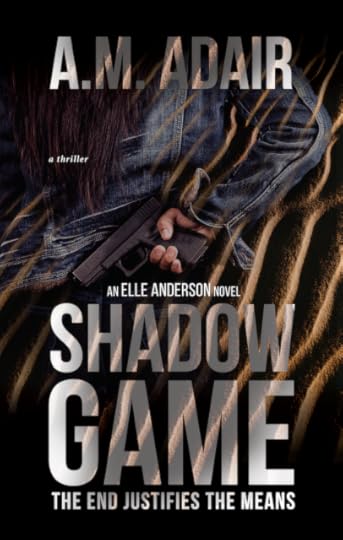
AVAILABLE ON AMAZON
Elle Anderson waited until he was right on top of her. When he turned to yell for security, she shot her blade across the back of his ankle, cutting his Achilles tendon. The shock robbed him of his voice, and his body went crashing to the ground. She covered his mouth and slit his throat.
His body convulsed, making it harder to drag him into the shadows, but she needed to buy herself some time. She couldn’t risk one of the other men spotting him lying on the ground. It wasn’t perfect, and the man was still in the throes of death, but she had to go. Even if help were to arrive in the next couple of minutes, it would be too late. The only question was: How much time did she have before she had pursuit?
Sent in by the CIA, Elle Anderson leads a small, elite team charged with destroying the most dangerous terrorist organization the world has ever known. She is intelligent and resourceful and capable of anything, but she works in a world where emotions and distractions are unacceptable.
It’s a world with no set rules and where the game is driven by will. This sometimes means acting more like the villain than the hero, because it could mean the difference between life and death.

Published on October 22, 2019 00:00
October 20, 2019
Ken Atchity Quote...
“If you have a dream, you have a responsibility to yourself and to us to make it come true. That’s the most important thing in your life. Don’t let anything stand in its way.”
― Kenneth John Atchity, The Messiah Matrix
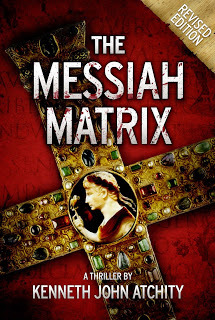
AVAILABLE ON AMAZON
― Kenneth John Atchity, The Messiah Matrix

AVAILABLE ON AMAZON

Published on October 20, 2019 00:00






